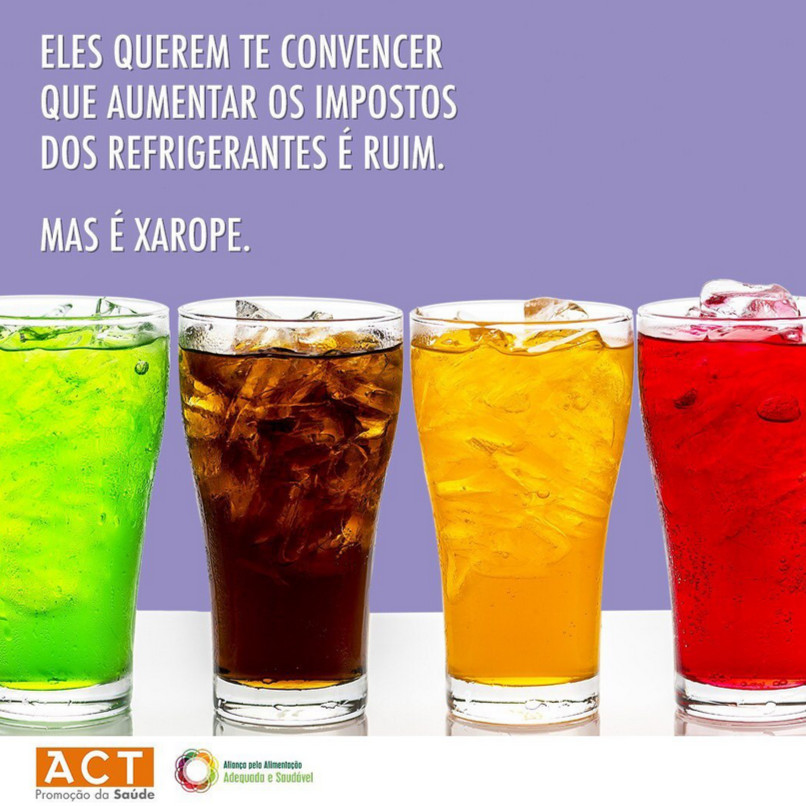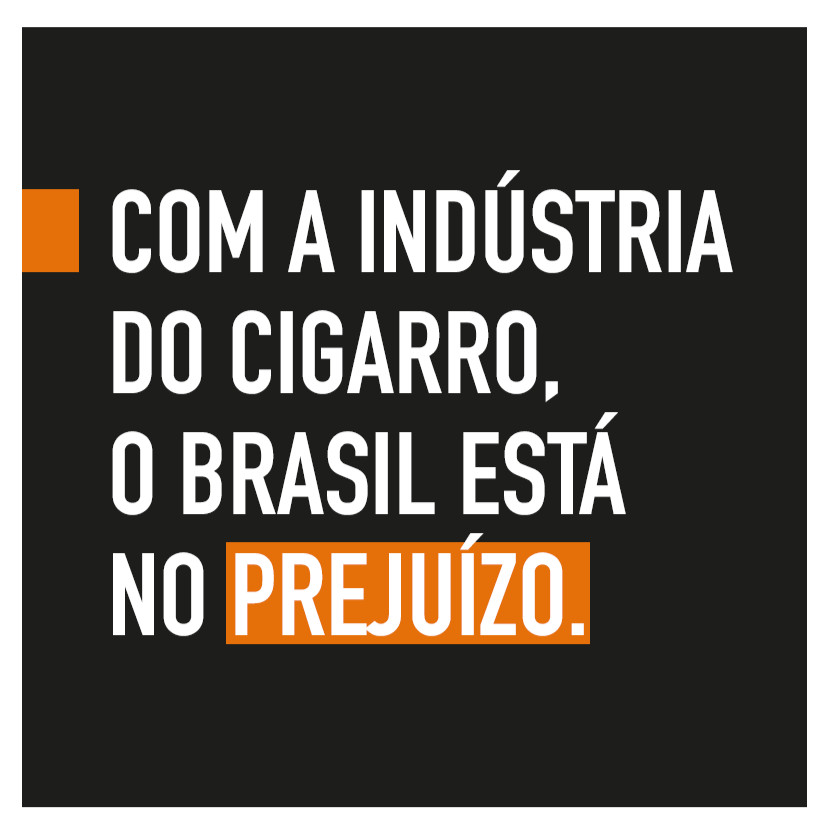monitorACT | Special edition: Blackwashing
08.11.23ACT Health Promotion

Editorial
Awareness about racism has increased among the Brazilian population recently. As it grows, so does the representation of black people and the use of symbols linked to Afro-Brazilian culture in cultural and audiovisual productions, as well as advertising campaigns.
For a better understanding of the matter, nutrition researchers Vitória Moraes and Letícia Portugal, from Universidade Federal Fluminense, studied the alleged commitment to anti-racism that industries that produce harmful products to health claim to make and came to the conclusion that it is nothing but a tactic to increase the sale of these products among the black population - which is also the most affected by non-communicable diseases associated with the use of tobacco, alcoholic beverages and ultra-processed products. The study resulted in the production of Blackwashing Report - are corporations engaged in the racial cause?, launched by ACT and detailed in this edition.
Blackwashing is an attempt to rebuild the corporate image of some companies and improve their reputation. It is similar to greenwashing, which gives a false appearance of sustainability without real changes, but in the social and racial area. Considering marketing practices, ultra-processed foods ads targeted at the black population can even be considered abusive advertising, as it encourages the consumption of products known to be harmful by a group that is already in a vulnerable situation.
In the text Nutricide: making the black population ill through the mouth, Vitória presents concepts linked to the racial issue and clarifies the relation between food and the way in which the black population is falling ill due to avoidable risk factors.
Alcohol, tobacco, racism and other drugs, by Letícia Portugal, addresses the fact that alcohol and tobacco consumption also affects more black and vulnerable people and how the companies try to improve the images of their products, using strategies to increase their sales in general and to the black population in particular.
Finally, with Many promises, few actions, Vitória dives into the seemingly magical acronym ESG, used to describe corporate actions claimed to be used to mitigate problems related to the environment, sustainability and governance, and concludes that the countries must invest in policies to fight structural racism and ensure that labor legislation is complied with, in addition to regulating companies and their activities. The corporations, in their turn, must respect the rules of the game and take responsibility for the effects of their activities on the population.
Enjoy your reading,
Anna Monteiro
Communications Director
Nutricide: making the black population ill through the mouth
By Vitória Moraes
In the 1990s, doctor Llaila Afrika created the term nutricide, which stands for the lack of access to healthy foods suited to the culture and the reality of a given population group and includes a racial approach, since black people are the most affected. Afrika presents two key points to understanding nutricide: the food culture imposed by European colonizers in their respective colonies, such as the ones located in Africa and Brazil itself, and the low access that black people have to healthy foods, such as fruits and vegetables, in opposition to the large consumption of ultra-processed products.
Considering that food is an essential part of cultural formation, the destruction of a food culture not only means reduced access to healthy foods, but also violates customs and ways of living. The threat to food biodiversity must be considered in discussions about building healthier, more sustainable and equitable food systems, but this issue has remained present throughout the entire history of Brazil.
Slavery, latifundia, extermination of indigenous peoples, advances made over biomes, economic and political control in the hands of white Europeans: since the Portuguese arrived, Brazilian lands have been used for the cultivation of foods that end up exported. This meets the interests of the European market, without taking into account the ways in which other groups that lived here produced and ate. Thus, food becomes yet another instrument of power, ancient knowledge is devalued, and a single worldview and a certain way of eating are imposed - this is food cultural colonization, as named by Elaine Azevedo, nutritionist and food sociologist. It means that a lot of land that used to be destined for the cultivation of regional foods was replaced by large plantations whose production will be exported or used as raw materials for the food industry. This threatens the maintenance of different ways of producing and eating and harms mostly traditional communities, such as indigenous people and quilombolas.
The colonization of food culture occurs through the agro-industrial food system, agribusiness and ultra-processed products. Agriculture produces commodities that are traded in the financial market and used to manufacture ultra-processed foods. This causes many impacts to the environment, public health and the society in general, especially for groups with less political representation such as the black population, which also registers the worst health indicators, especially considering nutrition matters.
According to the Brazilian Institute of Geography and Statistics, in 2019, the black population accounted for more than half (56.2%) of the total Brazilian population - and 15.1% of this group had diabetes, while 48, 7% had hypertension.
The relation between the consumption of ultra-processed products and the prevalence and deaths caused by non-communicable diseases is widely documented and supported by robust scientific evidence. It is estimated that the consumption of ultra-processed foods is responsible for 57 thousand preventable deaths per year in Brazil, not to mention the damage caused by them to the health and well-being. That being said, national researches and surveys show that ultra-processed foods and drinks consumption is higher among black people than white people. In 2019, the National Health Survey showed that 28.6% of the black population consumes sugary foods on a regular basis, while only 15.7% of the white population reported the same. Data also indicates that black people consume less fruits and vegetables, practice less physical activities and have reduced access to healthcare services, which contributes to the high NCD prevalence in this group.
In his nutricide thesis, doctor Afrika also points out that black people have more access to foods with low nutritional value, which is due to a series of other factors. Generally speaking, black people still have lower income and education and, consequently, hold low-paying jobs. This gives them less purchasing power, which can make it difficult to acquire healthier foods. Studies also show that black people are the main habitants of food deserts and swamps, which are regions where healthy foods are not largely available, but that offer a large supply of ultra-processed products. This creates an extremely unfavorable environment for the adoption of healthy habits.
The current understanding of colonialism sees corporations as the great colonizers of the 21st century, since they are usually the ones who dictate the rules of the game, concentrate political and financial capital and shape food choices around the globe. Large transnational food companies are increasingly expanding their reach by enlarging their brands in the market and their political participation in decision-making spaces, even when it results in the weakening of public interest policies, which are especially essential for groups with low political representation. However, when their reputation is on the table, the industry does not miss a single opportunity of engaging in the topic discussed at the moment and positioning themselves as allies in the tackling of problems caused by and/or aggravated by their activities.
Corporations have been more pressured to position themselves in relation to racial equity and representation since the BlackLivesMatter worldwide mobilization, created in response to the murder of George Floyd, a black man killed by a white police officer in 2020 in the United States. As a result, the ultra-processed food industry began to display more black faces and elements of Afro-Brazilian culture in their ads, targeting the black population. The Blackwashing Report shows that Ambev, JBS, Nestlé, Carrefour and Coca-Cola expanded their partnerships with black influencers and started to engage in the racial cause. Several blackwashing advertising strategies were developed by the corporations between 2019 and 2021: black influencers were hired and ads were aired in soap operas. There were also instances of associations with non-governmental organizations and institutes to promote the acceleration of black leaders in corporate environments and with intellectuals, such as Celso Athayde and Sílvio de Almeida, current Minister of Human Rights.
Here it becomes necessary to point out that, in spite of all these strategies, food corporations actively take actions to weaken regulatory policies that seek to protect health and create environments that promote healthy eating, such as taxation, labeling, restriction of the supply of ultra-processed foods in schools and hospitals, and, obviously, regulations of advertising for these products. The tactics are old, but the outfit changes.
We need to pay attention to market co-optation and attempts to weaken causes that are so important to society. Then, we can move forward with effective measures to understand and fight a problem that is as complex as racism. It is necessary to watch and act, so that tomorrow is not just a new yesterday.
Alcohol, tobacco, racism and other drugs
By Letícia Portugal
In Brazil and worldwide, alcohol consumption is hyperstimulated through marketing campaigns and associations with a laid-back, young lifestyle. Many reasons account for alcohol consumption, including social interaction and cultural aspects. Thus, facing a consumer market with a huge potential, marketing campaigns are not only used to increase sales, but also to promote even more products and lifestyles that are harmful to health. The report “The Sobering Truth: Incentivizing Alcohol Death and Disability, a NCD Policy”, published by Vital Strategies in 2020, shows that Ab InBev invested about US$ 6.2 billion in advertising and marketing campaigns - the 9th largest investment in advertising campaigns in the world.
As there are more regulating policies implemented in developed countries, manufacturers have directed their actions to developing countries that have lower per capita incomes and greater regulatory loopholes. Pan American Health Organization (PAHO) highlights that Brazil is the third largest beer consumer in the world and that brands such as Brahma e Skol, both sold by Ambev, are some of the most consumed in the country. “Afroconsumo” survey, carried out by the company Etnus, shows that, in addition to beer, catuaba, wine, vodka, cachaça and whiskey are the alcoholic drinks most consumed by the black population in Brazil.
Alcohol consumption is measured in the country through national health surveys and social organizations that aim to promote healthy and sustainable lifestyles. Data from Vigitel, the Surveillance System of Risk and Protection Factors of Noncommunicable Disease by Telephone Survey, show that 19.2% of the black population consumes alcohol in an abusive way, compared to 16.6% of the white population. Besides considering race, it is also necessary to evaluate gender matters, as black women, who are affected by conditions that are harmful to their health, are more vulnerable to alcohol abuse and its harmful effects.
Tobacco is another product that affects health in Brazil and in the world. In many countries, including Brazil, marketing practices for tobacco products are limited or forbidden and there are also sale restrictions. Thus, in an attempt to reach new consumers, tobacco companies are promoting changes in their products, and their new bet is on electronic smoking devices. Even though they are forbidden in Brazil, they can easily be found in stores and marketed by digital influencers. According to the National Health Survey (2019), smoking prevalence is higher among the black and brown population (13.7% for the black population, 13.5% for the brown population, and 11.8% for the white population). Moreover, less school years, income and urbanization are risk factors for smoking in Brazil. So, it seems that the blacker and poorer you are, the greater the chances of you becoming a smoker.
Abusive consumption of alcohol, tobacco and other illicit drugs is directly associated with illness among the black population, and it is not a coincidence that this group is the one with the lowest indicators of leisure and health access. Consuming these substances on a regular basis results in mood swings and produces an impact on social relations and other aspects of life. The situation gets worse when we analyze health and prevention policies that are currently in place in Brazil: the National Health Policy for the Black Population (PNSIPN), which entered into effect in 2005, aims to promote health and equity in health access, but it is still not implemented throughout the country and there are few places that actually offer effective healthcare for the black population.
Considering all these weaknesses and nuances perceived in the daily lives of black Brazilians, it is important to highlight how big alcohol manufacturers are aiming their advertising campaigns to the black population. The Blackwashing Report analyzes the way in which symbols of Afro-Brazilian culture and partnerships with black influencers are being used to promote alcoholic beverages. One of the most emblematic cases concerns Devassa beer, which was suited for racial insults due to a black beer advertisement in 2012. After it was bought by Heineken, Devassa has undergone a rebranding process and assumed the identity of a tropical beer. The brand then began to present itself as an uplifter of black ancestry and culture and participated in a series of music festivals that are part of the black Brazilian culture, such as samba and axé music, besides using terms that were previously restricted to the racial debate and expressions of black culture, such as the concept of Afrofuturism.
Devassa’s rebranding, however, was planned and executed almost exclusively by white people. Looking up CBA B+G, the advertising agency that was responsible for the project, it is possible to see that their staff, exhibited in their own website, is mainly white. Besides that, Heineken’s advertising leaders are also white, which promotes a reflection on the complexity of having white people promoting products that are extremely harmful to health directly to the black population. It is also important to note that abusive use of alcohol also aggravates issues such as traffic accidents and domestic violence, as well as health problems.
In the case of beer, consumption is promoted not only by the advertising campaigns themselves, but also by the low prices and the extensive distribution of the product throughout the country - in addition to tax benefits and agreements with state governments.
Meanwhile, unlike alcohol companies, cigarette manufacturers have not developed blackwashing strategies. It is wondering why, considering that the history of the tobacco industry is marked by slavery, with recently registered cases in tobacco farms in Rio Grande do Sul and Santa Catarina, besides the fact that cigarettes are disproportionately consumed by the black population. It might be due to the fact that these actions are usually linked to marketing strategies, which is restricted for cigarette brands in Brazil, but it also makes us wonder about the companies not engaging in social causes and if they are worried with critical positions of society.
Nevertheless, alcohol and tobacco are present in important aspects in the history of Afro-Brazilian culture, including as ritualistic elements of African-based religions. The tobacco used for the ancestors did not include several toxic substances, however, neither was produced in a chain that heavily impacts society, especially vulnerable population groups. The current situation is marked by the co-optation, appropriation and resignification of these elements in such a way that they now represent true weapons for the black population, but at the same time provide stratospheric profits for a white minority. Data doesn't lie: excessive alcohol consumption and smoking kill more black people.
It is urgent to implement public policies that articulate intersectionalities with behaviors that are harmful to health, in addition to the adoption of stricter regulatory measures, such as restricting advertising for alcoholic beverages, similarly to what was done with tobacco products.
Many promises, few actions
By Vitória Moraes
Environmental, Social and Governance (ESG) is the acronym of the moment. It encompasses a series of initiatives developed by corporations which add long-term value that attracts more investments and consequently generates profit.
Through ESG, shareholders take part in negotiations and discussions regarding the accountability of corporations in processes that are harmful to public and planetary health, in addition to their impacts on the aggravation of social inequalities. It can be considered a rebranding of the well-known CSR, corporate social responsibility, with active participation of shareholders and a series of voluntary initiatives that are often used as a tool for managing corporate reputation in the face of public opinion, ending up in what we call washings, such as greenwashing, socialwashing and, now, blackwashing.
This trend has made many companies enter the game and assume new commitments to building a more sustainable world, both environmentally and socially. However, there is a distance between saying and doing. The initiatives and the disclosure of results are voluntary, and there is no standard for data disclosure nor evidence that the indicators used in the reports are truly adequate to evaluate the performance of ESG policies. Therefore, it is practically impossible to compare the activities carried out by the same corporation over time, as well as comparing different companies in the same sector. In an interview with O Joio e O Trigo, FGV researcher Melissa Velasco Schleich stated that many companies disclose their ESG achievements without undergoing any type of certification or third-party evaluation, which considerably reduces the reliability of the information.
Regarding racial equity, the Blackwashing Report analyzed goals and commitments made by manufacturers of ultra-processed products, alcoholic beverages and tobacco to the construction of more equitable corporate environments, in addition to racial literacy actions among their employees. The criteria used to select corporations to be investigated was their participation in Mover - Movement for Racial Equity, signed by more than 40 companies from different sectors, including the food and alcoholic beverage sector. According to the website, it aims to accelerate diversity, equity and inclusion processes within the companies and provide collective social investment to create a positive impact on education, job creation and society's awareness of racism. Mover announces a series of initiatives regarding jobs, literacy, awareness and promotion of more inclusive corporate environments, besides holding events and awards for the companies that are most committed to the racial cause.
The Blackwashing Report analyzes some emblematic cases, such as “Reverse Mentoring”, a racial literacy action proposed by Coca-Cola in 2019. At the time, black people with jobs positioned in a lower place in the corporate hierarchy discussed the racial cause with the company's vice presidents. According to Coca-Cola, this action would be a way to show the importance of reducing racism and being in favor of inclusion and diversity. However, asking people in lower job positions to explain racism to their superiors only reaffirms their inferior position in the corporate hierarchy, reinforces black people in places of service and is profoundly rude, in addition to not tackling the root cause of the problem. The Report also shows that many companies started investing in the creation of affinity groups for black employees and in hiring more black people for their respective teams after the worldwide repercussion of BlackLivesMatter, but most of the recruitment programs announced were restricted to the lowest-paid and lowest positions in the corporation's hierarchy, such as internship and trainee programs.
Despite the claims and practices adopted by corporations, an article written by Alma Preta for O Joio e O Trigo showed that black people are still a minority in leadership positions and receive lower salaries, which means that there is no effective change in the culture of the companies. Black professionals are generally allocated to operational positions, which represents a large contingent of workers with low wages and that often face violations of labor and human rights. The Blackwashing Report also highlighted that there is an absence of reporting channels and judicial support in cases of racial insults, since none of the corporations analyzed reported the existence of such tools in their corporate reports and official pages.
Similarly, an article published in the United Kingdom analyzed the actions proposed by corporations to promote gender equality and concluded that most of them barely touch on the issue of inequities, that the announced campaigns generally cover the companies’ inaction on other important fronts and that the creation of internship and trainee programs are mostly inefficient in promoting equity within the corporate environment. The authors also stated that companies use these narratives to position themselves as leaders while omitting a history of questionable postures and conducts, such as what was done by Carrefour, that created programs to promote racial equity after the murder of João Alberto Freitas, a black man, in one of their markets in the city of Porto Alegre (RS).
So many nuances reveal the need to implement strict regulatory measures to make these initiatives mandatory, instead of voluntary, and in fact hold corporations accountable for their influence in aggravating social inequalities and relations of oppression.
It is also worth mentioning that many of these companies face allegations of moral harassment, discrimination, violation of human and labor rights and use of labor similar to slavery throughout their production and distribution chains, especially in medium and low income countries that tend to have more regulatory loopholes.
Although companies claim that they want to achieve racial equity, their goals are generally not very clear and the documents that address the issue are vague. As its values are based on corporate manuals with a liberal and Western vision, their world perspective is unified. Deep down, poverty and racism have always generated profits, and now the fight against racism has also become a product.
For these reasons, governments must invest in policies to structurally combat racism and ensure that labor legislation is complied with, in addition to regulating companies and their activities, which mainly impact the lives of those that are part of vulnerable groups of society. The corporations, in their turn, must respect the rules of the game and take on the responsibility for the effects of their activities on the population. Finally, it is necessary to consider and value other perspectives of the world and other ways of doing science and strengthening social movements that are on the front line of the fight against racism.
MonitorACT
Proofreading and editing by Anna Monteiro
Graphic production by Ronieri Gomes
Monitoring team
Anna Monteiro
Bruna Hassan
Denise Simões
Fabiana Fregona
Laura Cury
Mariana Pinho
Marília Albiero
Victória Rabetim
Vitória Moraes
Blackwashing Report production team
Camila Maranha
Camila de Paula
Letícia Portugal
Vitória Moraes





